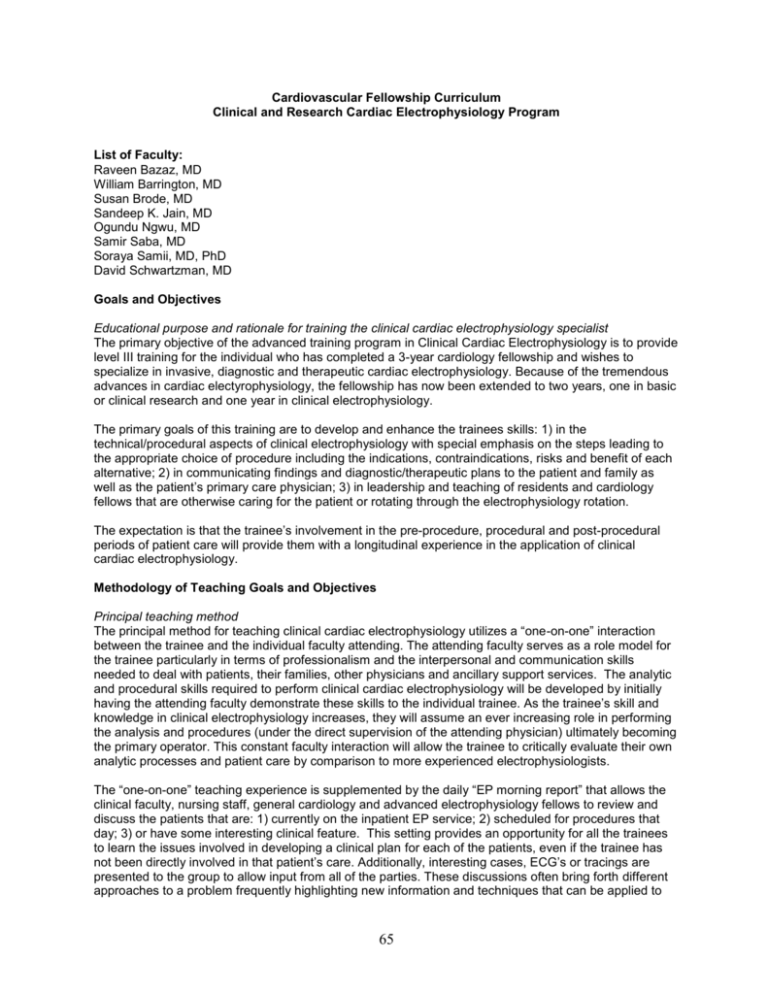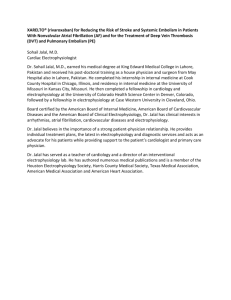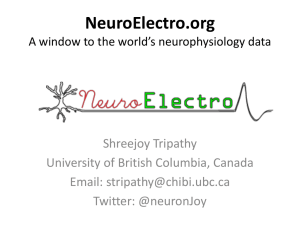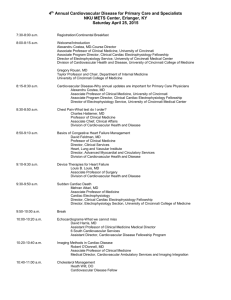Cardiovascular Fellowship Curriculum for the Advanced
advertisement

Cardiovascular Fellowship Curriculum Clinical and Research Cardiac Electrophysiology Program List of Faculty: Raveen Bazaz, MD William Barrington, MD Susan Brode, MD Sandeep K. Jain, MD Ogundu Ngwu, MD Samir Saba, MD Soraya Samii, MD, PhD David Schwartzman, MD Goals and Objectives Educational purpose and rationale for training the clinical cardiac electrophysiology specialist The primary objective of the advanced training program in Clinical Cardiac Electrophysiology is to provide level III training for the individual who has completed a 3-year cardiology fellowship and wishes to specialize in invasive, diagnostic and therapeutic cardiac electrophysiology. Because of the tremendous advances in cardiac electyrophysiology, the fellowship has now been extended to two years, one in basic or clinical research and one year in clinical electrophysiology. The primary goals of this training are to develop and enhance the trainees skills: 1) in the technical/procedural aspects of clinical electrophysiology with special emphasis on the steps leading to the appropriate choice of procedure including the indications, contraindications, risks and benefit of each alternative; 2) in communicating findings and diagnostic/therapeutic plans to the patient and family as well as the patient’s primary care physician; 3) in leadership and teaching of residents and cardiology fellows that are otherwise caring for the patient or rotating through the electrophysiology rotation. The expectation is that the trainee’s involvement in the pre-procedure, procedural and post-procedural periods of patient care will provide them with a longitudinal experience in the application of clinical cardiac electrophysiology. Methodology of Teaching Goals and Objectives Principal teaching method The principal method for teaching clinical cardiac electrophysiology utilizes a “one-on-one” interaction between the trainee and the individual faculty attending. The attending faculty serves as a role model for the trainee particularly in terms of professionalism and the interpersonal and communication skills needed to deal with patients, their families, other physicians and ancillary support services. The analytic and procedural skills required to perform clinical cardiac electrophysiology will be developed by initially having the attending faculty demonstrate these skills to the individual trainee. As the trainee’s skill and knowledge in clinical electrophysiology increases, they will assume an ever increasing role in performing the analysis and procedures (under the direct supervision of the attending physician) ultimately becoming the primary operator. This constant faculty interaction will allow the trainee to critically evaluate their own analytic processes and patient care by comparison to more experienced electrophysiologists. The “one-on-one” teaching experience is supplemented by the daily “EP morning report” that allows the clinical faculty, nursing staff, general cardiology and advanced electrophysiology fellows to review and discuss the patients that are: 1) currently on the inpatient EP service; 2) scheduled for procedures that day; 3) or have some interesting clinical feature. This setting provides an opportunity for all the trainees to learn the issues involved in developing a clinical plan for each of the patients, even if the trainee has not been directly involved in that patient’s care. Additionally, interesting cases, ECG’s or tracings are presented to the group to allow input from all of the parties. These discussions often bring forth different approaches to a problem frequently highlighting new information and techniques that can be applied to 65 the problem at hand. In this manner, the faculty serves as a role model of system based practice and demonstrate for the trainees a practice that utilizes system based learning for improvement in clinical care. Educational Content Mix of Disease Approximately 60% of patients seen by the cardiac electrophysiology service are referred for evaluation of ventricular arrhythmias, 30% for evaluation of superventricular arrhythmias with the remainder referred for evaluation of syncope, palpitations or an abnormal electrocardiogram. The majority (60%) of patients have atherosclerotic coronary disease or a cardiomyopathy, while 30% have a structurally normal heart. The remainder have a variety of abnormalities including hypertensive or valvular heart disease as well as corrected (or uncorrected) congenital heart disease such as the Tetrology of Fallot. Patient Characteristics The patients seen by the University of Pittsburgh Medical Center Electrophysiology Service reflect the demographics and spectrum of heart disease seen in Pittsburgh. The majority of the patients (~60%) are 60 years of age or older and are being evaluated for ventricular arrhythmias, conduction disease, atrial fibrillation or risk stratification following myocardial infarction. The remaining patients are under the age of 60 and will largely have supraventricular arrhythmias, syncope, non-ischemic or congenital heart disease. The majority of these patients will be male (~60%) with an approximately 50% split between in-patients and out-patient/same day procedures. Environment of teaching The teaching environment for the advanced cardiac electrophysiology fellowship includes two state-ofthe-art cardiac electrophysiology laboratories both of which are equipped with biplane cine-angiography capabilities, computerized mapping systems and digital display/stimulator systems. These laboratories have the capabilities of performing the entire range of invasive cardiac electrophysiology procedures including diagnostic EP studies, complex ablations and device implantation. An additional laboratory for device implantation and a minor procedure room that allows the performance of non-invasive programmed stimulation, tilt table testing and elective cardioversion procedures, supplement these facilities. Consultative services are provided on the inpatient wards and intensive care units at PresbyterianUniversity and Montefiore Hospitals as well as in the outpatient/clinic facilities on floor 5B at Presbyterian-University Hospital. Procedures and Services The full spectrum of diagnostic, interventional and therapeutic electrophysiology procedures are performed in the UPMC Electrophysiology Laboratories. During the advanced electrophysiology fellowship the trainee will have the opportunity to perform at least 200 invasive electrophysiologic procedures, approximately half of which will be for the evaluation of supraventricular arrhythmias. At times, these procedures will be utilized for strictly diagnostic purposes but, most commonly, they will serve to guide further therapy. Frequently, these procedures will provide the information necessary to perform catheter ablation and it is expected that the trainee will be involved in at least 75 radiofrequency ablation procedures during their training. The ablation procedures will involve a variety of arrhythmias including atrial tachycardias, tachyarrhythmias associated with the Wolf-Parkinson-White syndrome, atrial flutter, atrial fibrillation, AV node re-entry, and various ventricular tachycardias that are seen in both the normal and abnormal heart. In other situations, the electrophysiologic results will not be amenable to ablative therapy and will subsequently require placement of a pacemaker, defibrillator or cardiac resynchronization device. During the fellowship year the trainee will be involved in at least 75 pacemaker implantations/revision procedures and at least 50 defibrillator implantations/revision procedures. Additionally, with the increasing use of cardiac resynchronization therapy, the trainee can also expect to be involved in the performance of at least 25 of these procedures during their year of training. All of this 66 meets or exceeds the American College of Cardiology recommendations for Level III training in cardiac electrophysiology. While the technical skills of these invasive procedures are important, the trainee will also have extensive exposure to the non-invasive evaluation and follow up of implantable devices including at least 100 pacemaker follow up visits, at least 75 defibrillator follow up visits and at least 50 evaluation of devices that provide cardiac resynchronization therapy. Additionally they will acquire experience in the noninvasive testing of these devices on both an inpatient and outpatient basis. Pathological and Other Resources The pathology, radiology and laboratory services are fully supportive of the cardiovascular electrophysiology service. This involves pathology review of biopsy specimens as well gross specimens at autopsy. Complete radiological and laboratory services are also available with web based access to all laboratory, radiological and pathologic reports available though out the hospital. Educational Materials All the current standard cardiology texts are available in the fellows library along with selected cardiology journals and computers that allow access to Web-based medical information sources such as “up-todate.” Suggested Readings The recommended text for the clinical cardiac electrophysiology trainee is Clinical Cardiac Electrophysiology Techniques and Interpretations third edition by Mark Josephson, M.D. copyright 2002 by Lippincott, Williams and Wilkins. Supplemental electrophysiology texts include Cardiac Electrophysiology from Cell to Bedside by Zipes and Jalife published by William Saunders Company and Interventional Electrophysiology second edition by Igor Singer published by Lippincott, Williams and Wilkins. Frequently, specific questions will arise that are best addressed with selected articles from cardiology or electrophysiology specific journals. These may be recommended by the faculty – or found during a literature survey conducted by the trainee. In any event, many of these references are available in the University of Pittsburgh Medical library or various Web-based sources. Formal Conferences Two electrophysiology specific conferences are included in the cardiac electrophysiology curriculum: 1) didactic lectures that are integrated into the cardiology lecture series covering a variety of electrophysiology topics including cellular electrophysiology, techniques of device implantation, comparison of pacing modalities etc…all of which are given by the electrophysiology faculty and; 2) “journal club” that looks at a topic of the trainees choice. These articles are typically chosen based on a recent case or pertinent clinical question and are directed/presented by the trainee with the other trainees and EP faculty/staff in attendance. Method of Fellow Evaluation The “one-on-one” teaching method employed on the cardiac electrophysiology service leads to frequent verbal feedback/evaluation of the trainee’s progress in every aspect of their electrophysiology training. This frequent interaction allows the faculty the opportunity to observe not only the trainee’s procedural skills, but also their professionalism, interpersonal and communication skills. These observations will provide the basis for the formal written evaluation completed by the faculty at the end of each rotation. This evaluation is provided for the trainee’s review so that he may sign it if he concurs with the assessment or discuss any disagreement with the faculty at that time. 67 Responsibilities of the Electrophysiology Fellows The cardiac electrophysiology fellow is responsible for the evaluation and treatment of the electrophysiology patients in collaboration with the attending faculty. They must be available throughout the working day by pager and must notify the Program Director and supervising faculty if they are unexpectedly required to be absent. All electrophysiology fellows are expected to attend and participate in the daily EP morning report that begins at 8AM Monday through Friday. This means the trainee should be prepared to discuss any patients they performed procedures on the prior day as well as any patient they plan to perform procedures on that day. This will provide the trainee with experience in the continuum of patient care by allowing them to assess the effectiveness of their care, hone their interpersonal/communication skills and develop a sense of the normal course of various types of cardiac electrophysiology disease. It is expected that the electrophysiology trainee will interview/examine the inpatients the night before the procedure, performing an appropriate history/physical with review of the records and formulation of a plan that can be presented at EP morning report. In the case of outpatients, a similar evaluation may be performed when the patient arrives in the outpatient area on 6G. The electrophysiology trainee will then be involved in performing the procedure, with increasing degrees of involvement as their experience and skill grows. They will be expected to check on the patients they performed procedures on – before leaving for the day and will be available during the regular workday to address any concerns that may arise during the post procedure period. If the patient received an implanted device, the fellow will be expected to evaluate the post-operative chest x-ray and perform the pre-discharge device evaluation the following morning. When the electrophysiology fellow is assigned to the consultative service, they will be responsible for the organization of the EP consultation service with attention towards a fair distribution of patients between the other rotating cardiology fellows and appropriate prioritization of patients in terms of the immediacy of consultation and the need for an EP procedure. The objectives for each of the clinical rotations will also be provided for the trainee at the beginning of the 12-month fellowship and will be reviewed at the beginning of each rotation. Duty Hours The duty hours for the cardiac electrophysiology fellow conform to the guidelines issued by the Graduate Medical Education committee of the University of Pittsburgh and have the same restrictions regarding work or “moonlighting” outside of the electrophysiology training program. The Cardiac Electrophysiology fellow does not have any over night or in house call responsibilities. One weekend call can be expected each month with the duty consisting of rounding on the inpatient service and seeing new consultations with the attending staff both Saturday and Sunday morning. The fellow is not responsible for any over night call duties on Friday, Saturday or Sunday night. This schedule also applies to University holidays. Procedure Logs Each electrophysiology trainee is responsible for maintaining a log of supervised procedures. The format of this log should conform to the procedure log contained in the UPMC Fellowship in Cardiovascular Disease program manual and should contain at a minimum entries for Patient, Date, Procedure Type, Indications, Diagnosis, Complications and Supervisor Signature. Copies of this log should be provided to the Electrophysiology Training Program Director every quarter for inclusion in the trainee’s file. If these logs are not provided, it will be impossible for the Program Director to certify that the trainee has fulfilled the requirements of the Electrophysiology Fellowship. 68 Expected Electrophysiology Fellow Accomplishments Following the successful completion of this fellowship, the trainee will have achieved level III training in Clinical Cardiac Electrophysiology with a wide range of experience as a consultant in arrhythmia management with the invasive skills to perform electrophysiology studies, catheter ablations and implant pacers, defibrillators and cardiac resynchronization devices. June 2005 69







